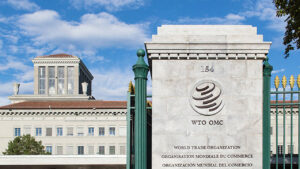BANGKOK — The World Trade Organization (WTO) warned against rolling back the tide of globalization, saying that such a process will make the world poorer, and added that the Asia-Pacific region’s prominent role in global trade will result in an outsized impact should trade become less seamless.
“(Southeast Asia and the Pacific) are important players in global trade and central to some of the issues which we are now grappling with,” WTO Director-General Ngozi Okonjo-Iweala said in a recorded message to participants at a WTO-organized conference in Bangkok on Tuesday.
“As the world navigates the polycrisis of climate change, pandemic, economic slowdown, inflation, food insecurity, and depletion of the oceans’ resources, we need multilateral cooperation and solidarity more than ever,” she added.
Ms. Okonjo-Iweala said the fragmentation of trading arrangements “would be costly for all economies, particularly poorer ones. WTO economists estimate that if the global economy decouples into two self-contained blocs, long-term global gross domestic product (GDP) would decrease by at least 5% — worse than the damage from the financial crisis of 2008-09.”
“Your region, where global supply chains are an important contributor to economic success, would no doubt be also impacted,” she added.
Ms. Okonjo-Iweala added that food security issues will be addressed during the WTO’s 13th Ministerial Conference (MC13) in February in Abu Dhabi, and called for a “pragmatic” approach to trading agricultural commodities.
“We need to look at how the growing concerns regarding food security can be incorporated and addressed holistically in the discussions. I do hope we can find a sensible and pragmatic approach to food security that will set members on the path to further progress in the years ahead,” Ms. Okonjo-Iweala said.
She was referring to the protectionist direction some countries have taken in keeping their agricultural goods from being exported as supplies of key commodities tightened in the wake of the Russian invasion of Ukraine.
“We also need to make progress on reforming agriculture trade. We’ve been negotiating on this for more than two decades, with success in eliminating export subsidies. But big issues related to farm subsidies and tariffs remain unresolved,” she added.
Ms. Okonjo-Iweala urged members to move quicker in ratifying the fisheries subsidies agreement reached during MC12 in June 2022. The agreement seeks to restrict illegal, unreported, and unregulated fishing.
“(The agreement) will only enter into force once two-thirds of the WTO membership has accepted it,” Ms. Okongjo-Iweala said.
“We need to complete the ‘second wave’ of negotiations on fisheries subsidies by agreeing on new discipline (against) harmful subsidies that contribute to overfishing and overcapacity, while at the same time taking into account the needs of fishing communities in developing and least developed countries,” she added.
Ms. Okonjo-Iweala said MC13 is expected to focus on reforming the organization’s dispute settlement system.
“Many members have identified this as their top priority. Ministers agreed at MC12 to have a fully- and well-functioning dispute settlement system in place by 2024; discussions are under way, but this is a difficult issue and we don’t have a lot of time if we’re to engage in substantive negotiations and achieve results. Nevertheless, the ongoing work on this issue is moving in the right direction,” Ms. Okonjo-Iweala said.
She said the WTO is also hoping to deliver one or two accessions at MC13, while other issues that could be discussed in the conference include the effective application of special and differential treatment for developing and least developed members and access to COVID-19 therapeutics and diagnostics. — Revin Mikhael D. Ochave
